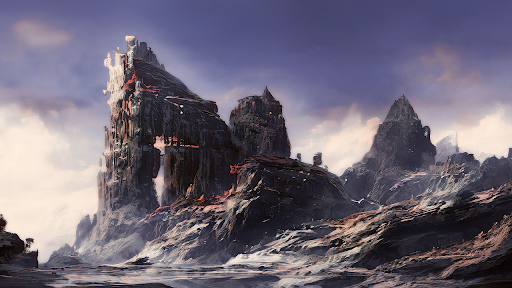Written by: Aiden Pass

Building a whole new world from scratch (AKA worldbuilding) is not that big of a deal. The practice doesn’t require specific neurons to be connected at birth. Much like any creative skill, worldbuilding can be cultivated. Worldbuilding may also be one of the most universally applicable skills in creative mediums. The skills and philosophies of worldbuilding can be applied to videogames, film, and tabletop roleplaying games, just as much as they can be applied to literature. So long as what is being made takes place in a second world, the craft will require worldbuilding.
Essentially, what I have written here is a guide on how to approach learning worldbuilding. I’m not teaching you every tenet of worldbuilding (college courses on the subject can’t even do that!) but what I am doing is teaching you how to teach yourself— or, how to get taught. That way, you can write science fiction or fantasy that isn’t a reimagining of a fairytale in the creative commons (cough cough nonfiction authors I’m calling you out cough cough).

1. Get Schooled
As I foreshadowed before, there are college-level courses that cover worldbuilding in literature! If you are a college student with an interest in creating your own starfaring culture or high fantasy countryside, then a great resource may already be available to you. You may have a cool professor who decided to create a course on the very subject. You may have to look around or ask your advisor to help, but if you are lucky enough to have a preexisting class on the subject, you have a priceless resource. Yes, the class won’t be able to cover every skill involved in building a new world, but what it will specialize in will give you a unique skillset most people don’t have.
Here at UConn, we are lucky enough to have a worldbuilding class. Currently, the course is run by Professor Grossman. The unique insight he provides is the history of worldbuilding; this includes but is not limited to: why common trends in worldbuilding continue to exist today, why certain trends die out, and what common questions need to be asked by the author in order for them to build a world.
So, of course, you will read Lord of the Rings, and you will learn the worldbuilding trends the series started. However, you will learn what Lord of the Rings did with race and class— things that definitely cannot be done today. You will explore what can be done today by reading recently published books, such as Race the Sands by Sarah Beth Durst. If you are currently enrolled at UConn or know someone who is, this is a class I cannot recommend enough. If you’re not a UConn student, then I still suggest you try to find a course that covers worldbuilding, as the unique skills the class will teach you will give you a specialization that you can use to your advantage.

2. Insert Generic Advice Every Creative Has Heard Here
If you want to write, then read. If you want to make movies, then watch movies. If you want to worldbuild, then consume something that contains worldbuilding.
Of course, if you have a particular goal in mind, then align the content you consume with your goals. Watch Firefly, Tales from the Loop, and The Mandalorian if you want to film a TV series. Read any recently successful fantasy or science fiction novel if you want to write a second world. Do you want to be a better game master at tabletop roleplaying games? Then listen to popular tabletop roleplaying game podcasts. Yes, this is generic advice, but it really works.
However, there is something that does work better, and that’s doing it yourself. Write a script, novel, or adventure module. And if it’s bad, oh well. This is a learning experience where you can fail. Also, since you’re taking in good examples of worldbuilding from outside sources, you’ll teach yourself what effective worldbuilding is through the discrepancies between your worlds and their worlds. So, just do it.

3. Geeks, Nerds, and Niche Hobbyists
You think people who get paid to understand worldbuilding are the only ones who can teach you about worldbuilding? No, there are people who do that for free.
Yes, that’s right, people. This is the “Get Schooled” 2.0 section.
So, where are these free people? On the Internet. Thanks to the borderline occult obsession we geeks, nerds, and niche hobbyists have with science fiction, fantasy, and tabletop roleplaying games, there’s a cornucopia of resources that can teach you effective worldbuilding for free on your own time. If you do a simple search for “worldbuilding” on a platform such as YouTube, you’ll find a long list of content creators who have made a living off worldbuilding discussions.
I have a few recommendations. TaleFoundry covers mostly myths and modern folktales/creepypastas. However, it does have a worldbuilding series that breaks down the worldbuilding in a mechanical way. HelloFutureMe covers worldbuilding differently than TaleFoundry in that it focuses on storytelling nuances in worldbuilding. A recent example was the video they did on fallen civilizations, found here. Brandon Sanderson, an author famous for his lectures on worldbuilding, has his own YouTube channel where he posts his lectures, found here. So, if your college doesn’t provide a worldbuilding course, you can take one for free through his channel.


You must be logged in to post a comment.